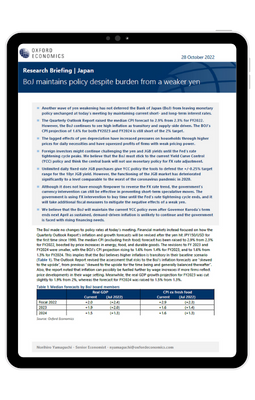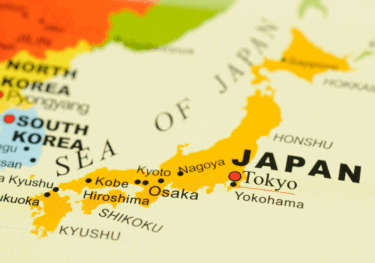BoJ maintains policy despite burden from a weaker yen

The BoJ made no changes to policy rates at today’s (28th Oct) meeting. Financial markets instead focused on how the Quarterly Outlook Report’s inflation and growth forecasts will be revised after the yen hit JPY150/USD for the first time since 1990. The median CPI (excluding fresh food) forecast has been raised to 2.9% from 2.3% for FY2022, boosted by price increases in energy, food, and durable goods. The revisions to FY 2023 and FY2024 were smaller, with the BOJ’s CPI projection rising to 1.6% from 1.4% for FY2023, and to 1.6% from 1.3% for FY2024. This implies that the BoJ believes higher inflation is transitory in their baseline scenario.
What you will learn:
- The lagged effects of yen depreciation have increased pressures on households through higher prices for daily necessities and have squeezed profits of firms with weak pricing power.
- Unlimited daily fixed-rate JGB purchases give YCC policy the tools to defend the +/-0.25% target range for the 10yr JGB yield. However, the functioning of the JGB market has deteriorated significantly to a level comparable to the worst of the coronavirus pandemic in 2020.
- We believe that the BoJ will maintain the current YCC policy even after Governor Kuroda’s term ends next April as sustained, demand-driven inflation is unlikely to continue and the government is faced with rising financing needs.
Tags:
Related Resouces

Post
Tariffs and Politics Leave the BoJ Powerless in Japan
The Bank of Japan kept its policy rate at 0.5% at its July meeting. We continue to think the BoJ will exercise caution on rate hikes despite still-high inflation and a recent trade deal with the US.
Find Out More
Post
US-Japan Trade Deal Fails to Shift Japan’s Growth Outlook
We estimate that the US's effective tariff rate on Japanese products is around 17%, in line with our baseline assumption. Lower tariffs on autos are a positive, given the sector's significant contribution to the economy and its broad domestic supporting base
Find Out More
Post
Japan’s Rising Political Instability Will Undermine Fiscal Discipline
The ruling Liberal Democratic party (LDP) and its partner Komeito lost their majority in Japan's upper house elections on July 20. Although Prime Minister Shigeru Ishiba will likely stay to avoid political gridlock, especially to complete tariff negotiations with the US, the political situation has become fluid and could lead to a leadership change or the reshuffling of the coalition.
Find Out More